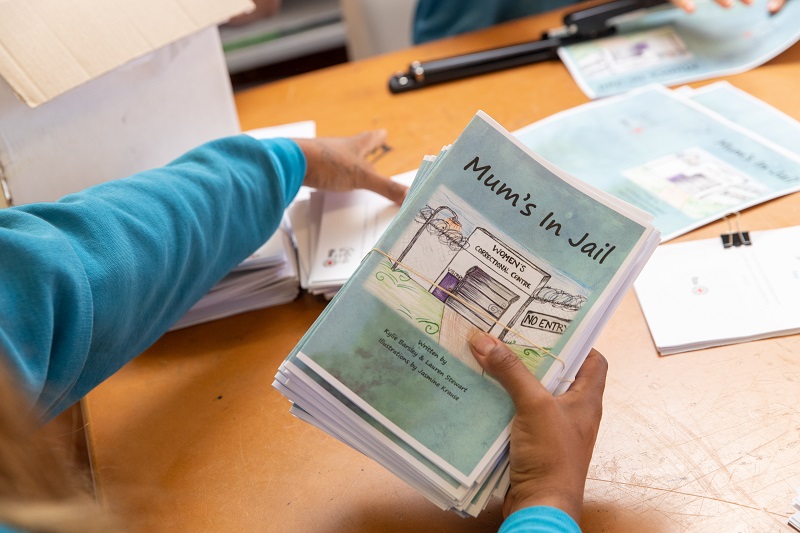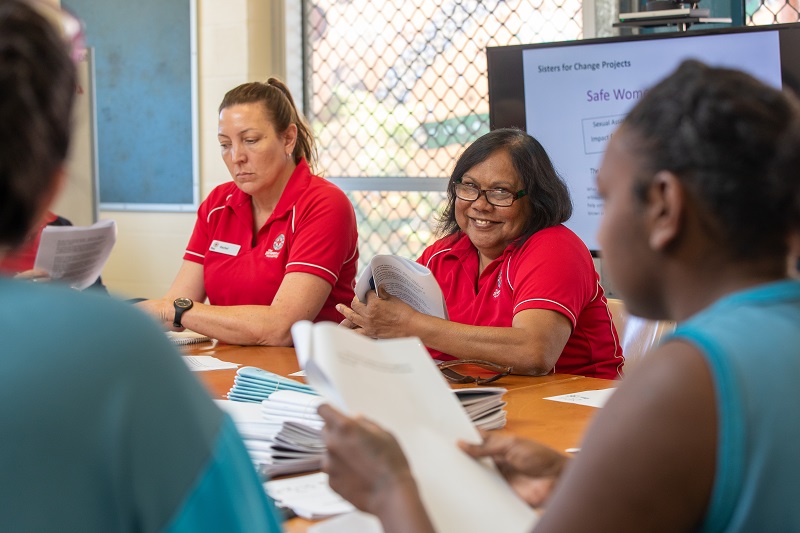Kind ideas change lives
How one book is giving these women hope for a fresh start and a brighter future for their families. In Townsville there’s a group of strong, determined women.
They’ve faced some of the most painful things a person could go through. They’re survivors of domestic and family violence. They’ve experienced poverty, housing insecurity and mental health concerns. And now they’re in prison.
Kellie* is one of the women – when she first arrived at the prison she was devastated over being separated from her kids and family.
She came up with an idea for a book called Mum’s in Jail. It explains to kids in a simple way what life is like for their mum inside, helping to make things less scary for little ones. It also comes with a postcard and pay phone instructions, helping other mums like Kellie let their children know they care.
A book, a postcard, a phone call. They’re small things. But they’re small things that have a big impact.
They’re small acts of kindness that keep families connected.
Your donation powers life-changing initiatives just like this. Show the power of your kindness today.

A fresh start
Kellie’s part of the Sisters for Change program, which brings prisoners, staff and Red Cross together to find ways to improve wellbeing in the prison community.
"It is with their amazing and continued support that I have endured a sense of belonging and self-worth, as well as the knowledge and understanding to overcome the things I cannot change."
It’s one of four Red Cross pilot programs run in Australian prisons. People in prison are encouraged and supported to sign up as Red Cross volunteers. They are offered training and mentoring, and support to lead on issues affecting their prison community.
The projects are many and varied. In Townsville, there’s the clean-up crew, where volunteers hold working bees to improve hygiene, Safe Women Workshops to talk about safety and solutions to violence and mental health training – among so many others.
"The seemingly small solutions that we've come up with can have a really big impact."
Changing hearts and minds
In just 12 months, 75% of those that took part in the Sisters for Change program said they felt like a different person from who they were when they came into prison.
They now feel empowered. Appreciated. And they’ve moved beyond being judged for their crimes, to being thanked for their actions.
“We had to change their mindsets, but once they got a hold of it, it was like wildfire!” says Glenda, Cultural Liaison, and Kalkadoon Waayni woman from Mount Isa and Gulf of Carpentaria.
Almost 70% of the women at Townsville Women’s Correction Centre come from Aboriginal and Torres Strait Islander backgrounds. Staying connected to culture and country is important for them – it helps them feel safer, and more supported when they return home.
Glenda brings in Elders from the community to visit the women, helping them connect with their culture, conduct bereavement ceremonies for loved ones who have passed back home and advocate for cultural education and safety within the prison.
They’re also their cheerleader on what is a difficult, but life-changing path to breaking a cycle of insecurity and disadvantage.

“I think them having connection with the Elders gives them a sense of belonging, a sense of, ‘well, when I get out, I'm going to have that support [of] my community’,” says Glenda. “Why can't we heal them in there before they come out, you know?”
There are many ways to measure the success of Sisters for Change: the prison is now cleaner, nurses are having more open and honest conversations with the women, and there’s less conflict and better relations between prisoners and officers.
Kellie measures it by how she feels now, compared to when she first arrived.
"I am able to serve my role as a Sister for Change with pride. I have gained the upmost respect from my fellow peers for the support I am able to give them."
She and the other Sisters for Change are giving all women in the prison the opportunity to grow, develop important skills, and make positive plans that will help them flourish once their term is served.
This is the power of kindness. It can ripple far and wide, keeping families connected, empowering strong women to thrive, and making communities healthier and safer.
*Names changed to protect privacy
It takes just one act of kindness to make a difference
Charity donations of $2 or more to Australian Red Cross may be tax deductible in Australia. Site protected by Google Invisible reCAPTCHA. © Australian Red Cross 2024. ABN 50 169 561 394